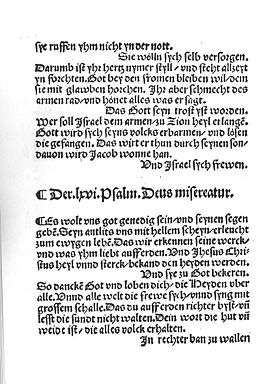Es woll uns Gott genädig sein
| "Es woll uns Gott genädig sein" | |
|---|---|
| Hymn by Martin Luther | |
 "Es wolt uns got genedig seyn" in the Erfurt Enchiridion, 1524 | |
| English | May God be gracious to us |
| Text | by Martin Luther |
| Language | German |
| Based on | Psalm 67 |
| Melody | by Matthias Greitter |
| Published | 1524 |
"Es woll uns Gott genädig sein" (May God be gracious to us,[1] or more literally: May God want to be merciful to us) is a Lutheran hymn, with words written by Martin Luther based on the Psalm 67. The hymn in three stanzas of nine lines each was first published in Wittenberg in 1524. The hymn, with a tune by Matthias Greitter, was set to music by composers including Heinrich Schütz and Johann Sebastian Bach. It was translated to English and has appeared in 25 hymnals.
History
Luther wrote in a letter to Georg Spalatin, around the end of 1523, about the importance of writing "Deutsche Psalmen" (German psalms). Trying to win Spalatin for collaboration, he specifies:
.jpg)
"Neue und modische Wörter sähe ich gern vermieden; denn um die Gemeinde zu gewinnen, muss man ganz schlichte und volkstümliche, doch zugleich saubere und geeignete Wörter wählen, und der Sinn soll klar und möglichst psalmnah wiedergegeben sein. Deshalb muss man frei verfahren und den angenommenen Sinn ohne Rücksicht auf den Wortlaut durch geeignete Worte übertragen."[2]
(I would like to see new and fashionable words avoided; for in order to win the congregation, one has to choose quite simple and popular words, but at the same time clean and suitable ones, and the meaning should be rendered clearly and as closely to the psalm as possible. Therefore one has to proceed freely and transfer the assumed meaning without regard to exact text by suitable words.)
Luther wrote "Es woll uns Gott genädig sein" as a paraphrase of Psalms 67 in three stanzas of nine lines each.[1] It was first printed in Wittenberg in 1524, first in a leaflet together with "Aus tiefer Not schrei ich zu dir”, a paraphrase of Psalm 130.[3] It appeared then in Luther’s Ein weyse Christliche Messe zu halten und zum Tisch Gottis zu gehen (A way to hold a Christian mass and to go to the table of God). It was published the same year in the Erfurt Enchiridion.[4]
Lyrics
| German | Psalm (KV) |
|---|---|
|
|
Melody and settings
The hymn tune is by Matthias Greitter and appeared in 1524.[1] Johann Walter set it for four parts.[1]
Heinrich Schütz set it as part of his Becker Psalter of all psalms in German. Johann Sebastian Bach used it as the basis for chorale preludes, and in cantatas such as his second cantata as Thomaskantor in Leipzig, Die Himmel erzählen die Ehre Gottes, BWV 76, when he closed part I with the first stanza and part II with the last.[5]
Translation
The hymn was translated to English and has appeared in 20 hymnals.[6] A. T. Russell translated it as "May God unto us gracious be" and included it in his Psalms & Hymns, printed in 1851.[6] Richard Massie translated it in 1851 to "May God bestow on us His grace".[7]
See also
References
- 1 2 3 4 Browne 2011.
- ↑ Herbst & Hahn 2009, p. 25–26.
- ↑ Herbst & Hahn 2009, p. 27.
- ↑ BLC 2017.
- ↑ Braatz & Oron 2009.
- 1 2 Hymnary 2017.
- ↑ Hymntime 2017.
Bibliography
- Braatz, Thomas; Oron, Aryeh (2009). "Chorale Melodies used in Bach's Vocal Works / Es woll (or wolle/wollt) uns Gott genädig sein". Bach-Cantatas. Retrieved 18 February 2017.
- Browne, Francis (2011). "Es woll uns Gott genädig sein / Text and Translation of Chorale". Bach-Cantatas. Retrieved 18 February 2017.
- Herbst, Wolfgang; Hahn, Gerhard, eds. (2009). 299 Aus tiefer Not schrei ich zu dir. Liederkunde zum Evangelischen Gesangbuch (in German). Vandenhoeck & Ruprecht. pp. 25–27. ISBN 9783525503393.
- Dellal, Pamela (2012). "BWV 76 – "Die Himmel erzählen die Ehre Gottes"". Emmanuel Music. Retrieved 31 May 2014.
- Dreisbach, Günther (2017). "Lieder Martin Luthers" (in German). Günther Dreisbach. Retrieved 4 February 2017.
- "Martin Luther / Es wollt uns Gott genädig sein / Der Psalmus 67: "Deus misereatur nostri"". Der Spiegel. Retrieved 18 February 2017.
- "Es wollt uns Gott gen'dig sein". hymnary.org. Retrieved 18 February 2017.
- "May God bestow on us His grace". hymntime.com. Retrieved 18 February 2017.
- "Evangelical Lutheran Hymnary Handbook / Hymn Texts and Tunes". hymntime.com. Retrieved 18 February 2017.
External links
- Es woll uns Gott genädig sein: Scores at the International Music Score Library Project (IMSLP)
